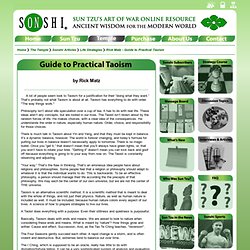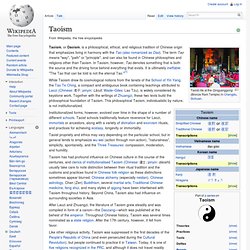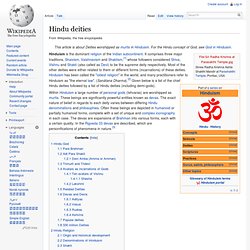

Home : Clear Vision Trust : Audio-visual Buddhism resources for schools and home use. Ask a Buddhist! The Bhagavad-gita As It Is - Multi-media Web Version. A searchable online Bible in over 100 versions and 50 languages. Taoism Virtual Library. Essentials of Buddhism - core concepts.
Brahman. Not to be confused with Brahma, the Hindu god, or brahmin, the caste or varna.

In Hinduism, Brahman (/ˈbrɑːmən/; Sanskrit: ब्रह्मन् brahman) is "the unchanging reality amidst and beyond the world",[1] which "cannot be exactly defined". It has been described in Sanskrit as Sat-cit-ānanda (being-consciousness-bliss) and as the highest reality. [note 1][note 2] Brahman is a Vedic Sanskrit word, and is conceptualized in Hinduism, states Paul Deussen, as the "creative principle which lies realized in the whole world".[7] Understanding the concept of Brahman[edit] An old Indian legend says that when a child asked his teacher what Brahman was, his teacher puzzled over a way to explain Brahman, and after some thought came up with this answer: "Imagine that here in front of me I have a sachet of salt, a spoon and a bowl of water, I then mix the salt into the water and let it dissolve; after some time I try and remove a spoonful of water from the bowl, a spoonful of water that does not taste salty.
How to Become a Taoist. Rick Matz's Guide to Practical Taoism. Sun Tzu The Art of War and Strategy Site. A lot of people seem look to Taoism for a justification for their “doing what they want.”

That’s probably not what Taoism is about at all. Taoism has everything to do with order. "The way things work. " Philosophy isn’t about idle speculation over a cup of tea. It has to do with real life. There is much talk in Taoism about Yin and Yang, and that they must be kept in balance. “Your way.” Taoism is an alternative scientific method. A Taoist does everything with a purpose. Basically, Taoism deals with ends and means. The Four Seasons gently succeed each other. The I Ching, which is supposed to be an oracle, really has little to do with divination/fortune telling. When considering a question, a hexagram is thrown. By the time this exercise has been completed, it doesn’t matter what the book says, the analyst has turned the problem over and over again. Finally the hexagrams should be considered with respect to the four seasons - what is the nature of how things change? First, Earth. Taoism.
Taoist rite at the Qingyanggong (Bronze Ram Temple) in Chengdu, Sichuan.

Taoism, or Daoism, is a philosophical, ethical, and religious tradition of Chinese origin that emphasizes living in harmony with the Tao (also romanized as Dao). The term Tao means "way", "path" or "principle", and can also be found in Chinese philosophies and religions other than Taoism. In Taoism, however, Tao denotes something that is both the source and the driving force behind everything that exists.
It is ultimately ineffable: "The Tao that can be told is not the eternal Tao. While Taoism drew its cosmological notions from the tenets of the School of Yin Yang, the Tao Te Ching, a compact and ambiguous book containing teachings attributed to Laozi (Chinese: 老子; pinyin: Lǎozǐ; Wade–Giles: Lao Tzu), is widely considered its keystone work. After Laozi and Zhuangzi, the literature of Taoism grew steadily and was compiled in form of a canon—the Daozang—which was published at the behest of the emperor. Ethics[edit] The Rambling Taoist. Hindu deities. Hinduism is the dominant religion of the Indian subcontinent.

It comprises three major traditions, Shaivism, Vaishnavism and Shaktism, whose followers considered Shiva, Vishnu and Shakti (also called as Devi) to be the supreme deity respectively. Most of the other deities were either related to them or different forms (incarnations) of these deities. Hinduism has been called the "oldest religion" in the world, and many practitioners refer to Hinduism as "the eternal law". (Sanātana Dharma). Given below is a list of the chief Hindu deities followed by a list of Hindu deities (including demi-gods). Hindu God[edit] Para Brahman[edit] Adi Shankara has said that there is only one Supreme Para-Brahman and all of the other deities are the forms and expansions of this Para-Brahman. Adi Para Shakti[edit] Devi Amba (Amma or Amman)[edit] Goddess Durga slaying the buffalo-demon. Popular Goddesses worshiped in Hinduism are Lakshmi, Saraswati, Parvati, Durga, and Kali. Trimurti and Tridevi[edit]